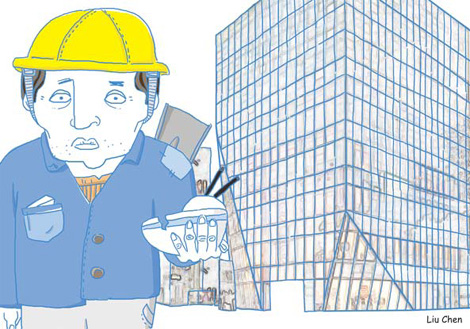Comment
Meal time at construction site
By Qi Zhai (China Daily)
Updated: 2010-01-15 09:11
 |
Large Medium Small |

When I was working in Manhattan as a management consultant (this was years before "bailout" and "financial crisis" entered into quotidian small talk), swanky restaurants and elaborate dinners were part of the regular "team-building" and "client meeting" routines.
After I moved over to an investment bank, the meals got better and more frequent. With the help of corporate expense accounts, my taste buds blossomed into a thousand little discerning and fickle things.
My personal spending also elevated to match my corporate entertainment lifestyle. The "Dining Out" portion of my monthly household expense report consistently grew. At the peak of the Asian equity bubble two years ago, I didn't blink twice when I charged 200 euros on brunch for just moi at a Michelin-starred restaurant in Paris.
I've wined and I've dined, but none of these gourmet experiences were as memorable as a particular meal that I didn't eat.
Recently, I was walking through Sanlitun near sundown. As I crossed the pedestrian bridge at Yaxiu, I looked down to see a big group of dusty-haired, tan-skinned construction workers, each holding two tin canteens, lining up to get dinner.
The clothing they bundled around their bodies was mostly bedecked with holes, patches, and stains. Many of them wore shoes with soles that were peeling off into a gaping hole. Some wore red string around their waists to hold up ill-fitting pants.
It had been a long time since I paid attention when passing a construction site. I was stunned by the contrast in appearance between these hard-working men and the hardhat, flannel shirt, and Caterpillar boot-wearing construction workers in New York. Yet, far from looking decrepit or weary, most of these Chinese workers wore expressions of excitement and hearty happiness. I was captivated.
I stopped for a closer look and saw that dinner was being ladled out of basins set atop large oil barrels. One barrel was heaped high with white rice that gleamed in the dusk. The other held an ambiguous-looking cabbage stew. While the "cafeteria lady" slopped rice and stew into each man's canteens, others at the back of the line jostled each other in a friendly way.
The food certainly didn't look appetizing. There were no enticing colors to indicate anything fresh in the ingredients. But the workers buzzed around the barrels happily, like bees drawn to a flower ripe with pollen. Their eyes shimmered with anticipation. They elbowed each other with laughter. Some even rubbed their bellies and smacked their lips in exaggerated impatience.
I realized then that the food they were about to eat was better than any caviar, foie gras, or Dom Perignon that ever touched my lips. Their meal, earned through hard work, would taste heavenly because their bodies deserved every bite of what would be ladled into their tins.
I also remembered, with guilt and shame, the times that I ordered an excessive dessert just to end my dinner on a sweet note, commanded an extra dish "just to taste", and threw out a bag of restaurant leftovers because it sat in the fridge for too long. With regret, I contemplated our cultural habit of deliberately serving too much food at a banquet, just to show guests how well they're provided for. With material abundance and the alleviation of real hunger, most of us no longer remember what it's like to enjoy food because we need it.
As night began to fall, I walked away from the scene. With every step I resolved to work harder, waste less and to always remember that someone really deserves the simple meals that I've come to take for granted.










